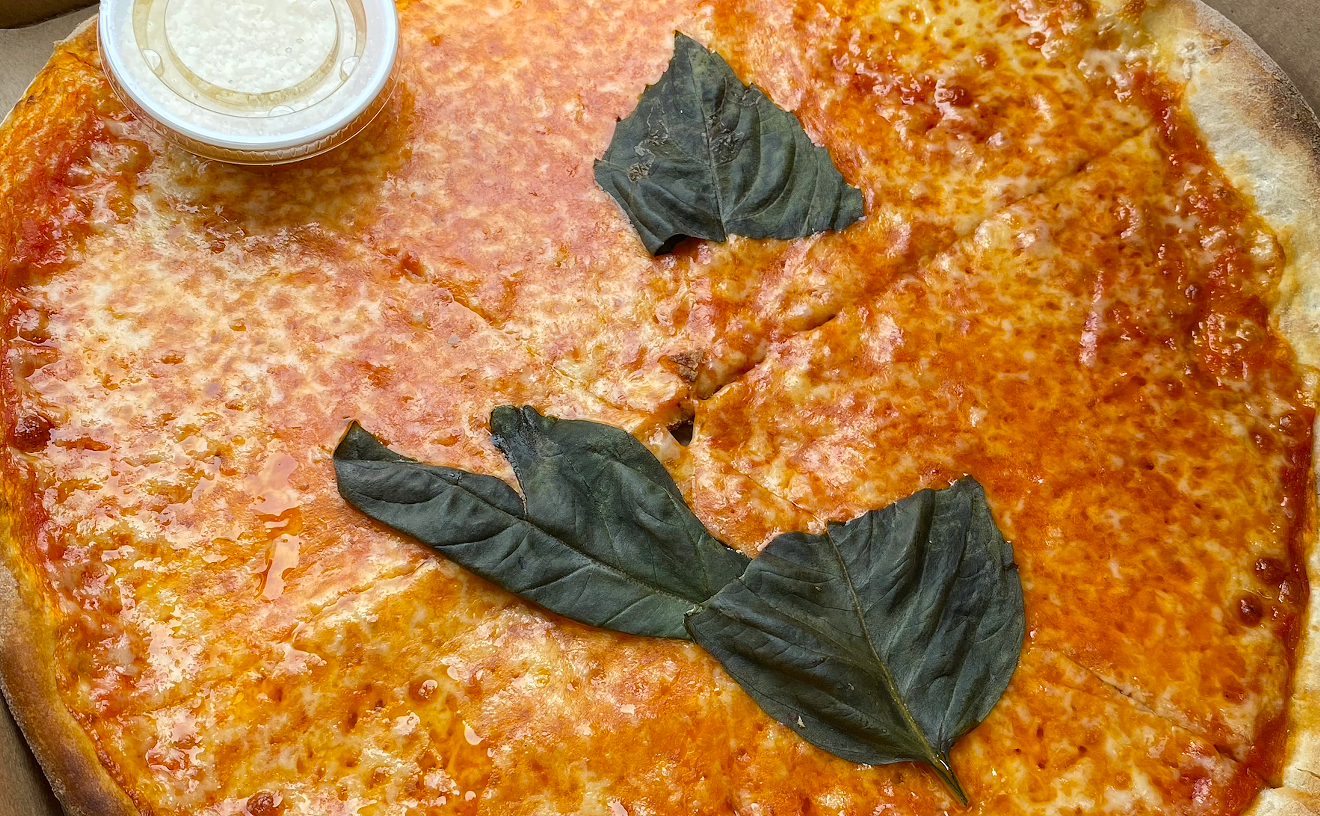It's a classic immigrant story: A pair of Greeks set out to create a restaurant providing fresh food inspired by their homeland. But along the way, Sophia Mylona picked up a degree in nutrition from New York University, and her husband, Gus Leontarakis, ran a New Jersey catering company. After they met in Greece in 1980 and Mylona joined Leontarakis in Florida in 1983, the couple craved the authentic meals they knew from sit-down dinners in Greece. Retired and slightly bored, they decided to go back to work with this new undertaking.
For their new mecca, they chose a Denny's. Well, a lot on the corner of A1A and Oakland Park Boulevard in Fort Lauderdale where a Denny's once stood. Thasos Greek Taverna opened August 8.
The former diner was remodeled into a sleek, white stucco building with windows that are deep-set and made of mismatched, variously sized rectangles, all lit by soft pink, purple, and blue lights that give the building a chic but inviting glow. In the parking lot, valets now scurry about, juggling keys from Mercedes and Maseratis and Rolls-Royces. That outdoor scene bears little similarity to the Greece of today, which finds itself as the poster child for the European economic crisis. But inside, Mylona and Leontarakis aim to give diners a sense of the homeland they remember.
The restaurant is named after the tiny island of Thasos, which lies to the far north of the Aegean Sea and is famous for wine and seafood. Though the new building has some flashy touches, rustic food is the focus. Abundant fish and vegetables, like one might find in coastal Greece, guide the menu.
Mylona says she gets questioned about including the word taverna in the restaurant's name, given its trendy design and pricey food, but she wanted to make it clear she was creating a place where people can come at any time, in any dress, and enjoy themselves.
Judging from the crowd inside on two visits — a mix of families in sandals gathering around bountiful tables, couples at the bar sipping bright cocktails, grannies laughing over bottles of wine — her formula is working.
On our first step inside, we found a foursome of sheep greeting us with blank stares. These were waist-high stuffed (or were they taxidermied?) animals that offered a nod to the traditional ingredient of lamb and to the Greek countryside. The sheep seemed a weird touch, especially once we rounded the corner into the airy, all-white, high-ceilinged dining room, whose pastel ceiling lights mimicked those on the exterior. The lights gave the space the feel of a nightclub but were balanced out with old-fashioned touches like walls made of white-washed stones and a mosaic that depicts cottages lining the Greek countryside. There's an open kitchen, and wall-to-ceiling windows on the north side of the building allow fading daylight to filter into the dining room without blinding anyone. Tables and chairs are bright white, as is plate ware. Square, azure, translucent-glass bread plates are the only dots of color to be found and complete the mandatory Greek white-blue color palette.
The menu features all of the Greek comfort dishes found in both fine-dining or street-food settings, plus more-refined items. Mylona said that developing it was a team effort that involved herself, Leontarakis, and Giorgio Bakapsias, a Greek chef out of North Carolina who serves as a consultant and executive chef. The day-to-day kitchen operations are run by William D'Auvray, also of North Carolina, and former toque for Bu.Ku in Raleigh.
Pikilia, Greek spreads, lead and come in long, narrow canoes with triangles of grilled pita. (Pitas were made in-house when Thasos opened, but Mylona said the kitchen couldn't keep up with demand, so they must be outsourced to a local baker.) Taramosalata ($7) brought an off-white dish of salmon roe whipped with almond milk that's rich and creamy with the appropriate amount of brininess. The salty fishiness makes it an acquired taste.
A number of full-size entrées are on the menu, but it favors small plates and sharing portions. Some, like Brussels sprouts ($8), crisped with small cubes of pork belly and drizzled with honey, seemed out of place and a bit pricey. However, they tasted fresh and were cooked simply enough to let the flavor of the key ingredient come through.
The Thasos Summer Salad ($10) brought the familiar combination of watermelon, feta cheese, and basil. In Greece, this dish, called pouzi, is a popular summer bite. Here, about eight nearly perfect cubes of watermelon came topped with imported Greek feta cheese, drizzled with Greek olive oil, and dotted with micro arugula. The imported Greek cheese was what made this unique and worth ordering. Dense, off-white cubes offered feta's familiar tang but had the creaminess and depth of an expensive Brie.
Thasos also imports nearly two dozen Greek wines, guided by beverage director George Masroukas. Waiters know enough to explain unfamiliar varietals and hard-to-pronounce brands. A glass of Assyrtiko-Athiri ($12), from the Sigalas Winery on the island of Santorini, came deep golden, fruity, sweet, and just slightly dry. The grape grows almost exclusively on the island and is used to make sweet wines as well as dessert wines.
Lamb meatballs ($12), known as keftedes, arrived golfball-sized atop a streak of homemade tzatziki sauce — a combination of yogurt, cucumber, dill, and garlic — paired with a roasted tomato and fresh dill sprigs. These arrived not fried and flattened, as is traditional, but grilled, thus retaining all of their fatty natural juices.
Spanakopita ($9), Greek spinach pies, were wrapped as individual pastries rather than slices out of a larger pie. The phyllo crust was thin, flaky, and perfectly crispy. The chopped spinach filling, however, seemed a touch underseasoned.
Lamb chops ($29) were the biggest letdown, due to the combination of excess fat left on the chop, bland fried fingerling potatoes, and an overabundance of that good olive oil. A fish, though, was the star of the show.
Seafood makes up the largest part of the entrées, keeping with Mylona's adherence to the traditional Greek combinations of fish, legumes, and vegetables, plus a family history in fishing. Her father was a commercial fisherman in Greece and around the world, and Leontarakis had been a fisherman on Thasos, the Greek island, before moving to the United States. The menu includes lavraki ($33). Fish is sourced from Fort Lauderdale's Q Plus Seafood and other places.
Lavraki, a Mediterranean sea bass, was grilled whole with lemon and olive oil in the kitchen. Then servers deboned the fish tableside and re-served it with a squeeze of lemon. They had the good sense to offer us the head before disposing it. The pricey fish yielded two fillets that were perfectly flaky. The fish itself is delicate — one might even call it slightly bland — yet the simple combination of oil, lemon, and herbs gave it a flavor just as big and satisfying as well-marbled steak.
Anyone who has spent time in Greece may sneer and say that eating at Thasos is nothing like being on a hillside overlooking the Aegean Sea. Yet Mylona and Leontarakis have managed to import their homeland's highlights with food that's light and well-prepared and a menu that encourages sharing and an overall joie de vivre. They've pulled it off with a restaurant that's unmistakably Greek without being tacky. Coming here is a much shorter, cheaper trip than jetting to the real Thasos, and no one is protesting over the sovereign debt crisis. It's a trip we suggest you take.











